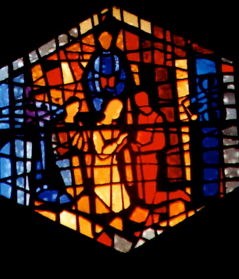|
Devotional Practices and Worship
It is obvious from the Gospels that Jesus observed the various Jewish festivals and religious rituals. There are numerous references in the New Testament to his participation in synagogue services. In addition, he spent much time alone in prayer and communion with God. All of these are acts of devotion and worship. “Worship” derives from the Old English word weorth, which meant what its modern form, “worth” denotes: that which renders something valuable and desirable. The worship of God recognizes that God is the source of all that is valuable and desirable, and that communion and fellowship with God is to be desired above all other things. This is expressed eloquently in a hymn of praise in the Book of Revelation: “You are worthy, our Lord and God, to receive glory and honor and power, for you created all things, and by your will they were created and have their being" (Revelation 4:11). This pithy little hymn describes the basis for worship of God (creating and granting being to all things), as well as the content of worship (offering to God honor and glory and power). |
The Spiritual Disciplines of Jesus |
Humans naturally tend to find value and worth in things, and to seek after that which they value. It is a basic driving force of human behavior. Acts of devotion and worship help to direct this natural tendency toward God and toward ultimate concerns. One way we demonstrate that something is of value to us is by the time that we devote to it, especially time that is our own to give, not time required to make a living or put food on the table. For instance, how much time do you spend each week watching or playing sports? How much time hiking in the woods or fishing? How much time working on projects? The time that you spend, that is your “free time” to use as you wish, is a direct indicator of the value you place on the thing you are doing.
Devoting time in the worship of God is a formal declaration of the high value we place in the life that has been made possible for us by the grace, mercy and love of God. Worship is the acknowledgement of our complete and utter dependence upon God for everything. It is not always easy to admit our dependence upon others for our well-being, but it is the most well-established fact of life: we are fully dependent upon forces outside of ourselves for our well-being, in fact for our being at all.
One of the hugest myths of our time is the fantasy of the “self-made man.” There is no such thing. A professor in the seminary I attended, Dr. Doug Adams, used to remind us of this fact graphically. He would say, “Do you know how you can tell a self-made man? He has no belly button!” There right in front of us, as an ever-present reminder of our dependence upon others for our well-being sits our belly button. Any time we feel too certain of our self-sufficiency and individual cleverness, we need only to pat our belly to remind ourselves that we are a product of forces and laws and creatures and people far beyond our reckoning and even our recognizing. Worship is the vehicle whereby we acknowledge our dependence upon these forces and creatures and people by acknowledging the One responsible for their being in the first place.
Worship helps bolster the spiritual life by reminding us and reinforcing within us the knowledge that we are part of something vastly grander and more profound than our own bounded and limited perspective. When I was in seminary, I lived in an apartment that was set on a hill overlooking the San Francisco Bay. I would often go up on the roof and look out over the city and across the bay to the Golden Gate Bridge. I could see cars driving on the bridges and boats making their way across the water. Whatever problem I had that seemed so overwhelming and pressing faded in intensity and diminished in size as I gazed out upon the larger world around me. The problems didn’t disappear, but the very exercise of gazing out onto a larger landscape helped me to realize that I was indeed part of something beyond my narrow point of view, and this helped me to understand that no problem was insurmountable, nor was it interminable.
Worship is just this sort of gazing out upon a larger landscape – a landscape that is universal in scale and unlimited in its timeframe. Nothing in human experience lasts forever, and this realization is a powerful antidote to despair and anxiety. Worship expands our horizons, lifts our spirits, and elevates our values.
The one thing in life we have absolute control over is how we act in the world – how we relate and react to others. The choices we make day to day about how we respond to those around us - what we say, how we treat people, how we spend out time, where we go, what we do - these are in our power of choice. It has been aptly said, “What we are is God’s gift to us, what we do with ourselves is our gift to God.”
This act of acknowledging in worship our dependency places us firmly in the midst of the complex network of relationships that make life possible. The remaining spiritual practices that follow are the means whereby we contribute to the well-being of others, and thereby become the channels and instruments of God’s grace in the world.
Devoting time in the worship of God is a formal declaration of the high value we place in the life that has been made possible for us by the grace, mercy and love of God. Worship is the acknowledgement of our complete and utter dependence upon God for everything. It is not always easy to admit our dependence upon others for our well-being, but it is the most well-established fact of life: we are fully dependent upon forces outside of ourselves for our well-being, in fact for our being at all.
One of the hugest myths of our time is the fantasy of the “self-made man.” There is no such thing. A professor in the seminary I attended, Dr. Doug Adams, used to remind us of this fact graphically. He would say, “Do you know how you can tell a self-made man? He has no belly button!” There right in front of us, as an ever-present reminder of our dependence upon others for our well-being sits our belly button. Any time we feel too certain of our self-sufficiency and individual cleverness, we need only to pat our belly to remind ourselves that we are a product of forces and laws and creatures and people far beyond our reckoning and even our recognizing. Worship is the vehicle whereby we acknowledge our dependence upon these forces and creatures and people by acknowledging the One responsible for their being in the first place.
Worship helps bolster the spiritual life by reminding us and reinforcing within us the knowledge that we are part of something vastly grander and more profound than our own bounded and limited perspective. When I was in seminary, I lived in an apartment that was set on a hill overlooking the San Francisco Bay. I would often go up on the roof and look out over the city and across the bay to the Golden Gate Bridge. I could see cars driving on the bridges and boats making their way across the water. Whatever problem I had that seemed so overwhelming and pressing faded in intensity and diminished in size as I gazed out upon the larger world around me. The problems didn’t disappear, but the very exercise of gazing out onto a larger landscape helped me to realize that I was indeed part of something beyond my narrow point of view, and this helped me to understand that no problem was insurmountable, nor was it interminable.
Worship is just this sort of gazing out upon a larger landscape – a landscape that is universal in scale and unlimited in its timeframe. Nothing in human experience lasts forever, and this realization is a powerful antidote to despair and anxiety. Worship expands our horizons, lifts our spirits, and elevates our values.
The one thing in life we have absolute control over is how we act in the world – how we relate and react to others. The choices we make day to day about how we respond to those around us - what we say, how we treat people, how we spend out time, where we go, what we do - these are in our power of choice. It has been aptly said, “What we are is God’s gift to us, what we do with ourselves is our gift to God.”
This act of acknowledging in worship our dependency places us firmly in the midst of the complex network of relationships that make life possible. The remaining spiritual practices that follow are the means whereby we contribute to the well-being of others, and thereby become the channels and instruments of God’s grace in the world.
|
|
In this video, we look at the way of worship and devotional practices. Jesus egged in the worship of God in the synagogue and temple, as well as on his own. He was known to have spent time in spiritual communion with the One he called "the Father," as he went off in solitude. Acts of devotion and worship help to direct the natural human tendency to find value and worth in things, and to seek after that which they value, toward God and toward ultimate concerns. Worship helps bolster the spiritual life by reminding us and reinforcing within us the knowledge that we are part of something vastly grander and more profound than our own bounded and limited perspective. |
Via Vida Session 38: JP21 The way of Ways: Devotion and Worship
Session Outline:
- Regather, greet
- Practice Centering Prayer
- Scripture Study: Psalm 150 and Isaiah 6:1-7
- What image or phrases caught your attention?
- What was most puzzling?
- What would you like to learn more about?
- What really spoke to your heart?
- View video for Session 38.
- Read “The Way of Devotional Practice and Worship” and discuss using the discussion questions provided.
- Close in prayer.
Next Practice: Time Alone in the Natural World.
Click on the images below to read about JP21-BiggerMind; JP21-Bigger Heart; JP21-Bigger World; JP21-Bigger Life; JP21-Way of Ways.
Click on the images below to read about JP21-BiggerMind; JP21-Bigger Heart; JP21-Bigger World; JP21-Bigger Life; JP21-Way of Ways.
Proudly powered by Weebly










